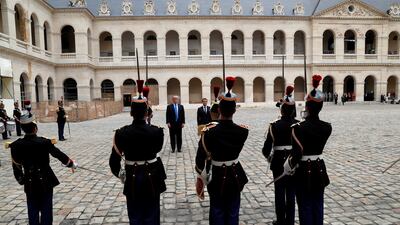Britain’s vote to exit the European Union, the election of Donald Trump in the US, Austria’s near-election of a far-right politician as president, and 11-million French voting for Marine Le Pen in the last presidential election were shocks to Western politics.
But these could be mere tremors preceding a devastating earthquake. Two factors build up the tectonic tension.
The first is the likely failure of reactionary populism, particularly in America. The election of Donald Trump is the biggest victory, so far, for populist nativism. It came out of the accumulated frustrations of many in the American lower middle classes at a world that is moving towards new economic and social realities that they abhor but feel powerless against. And so, they elected the loud man from outside the system that has orchestrated politics in the past few decades, who seems to have got things right (at least for himself), and who promised that he can turn back the clock to earlier times.
He can’t. The frustrations of his constituencies are hardly the results of a political system skewed in favour of entrenched forces. They are the outcomes of the declining competitiveness of large swathes of American industries and labour relative to the rising Asian middle classes.
Mr Trump can try to raise the competitiveness of large sections of Americans who have been falling behind in the last few decades, or erode the competitiveness of the rest. For the first to bear fruit, it needs tens of billions of investments for several decades. He doesn't have that time. The second would be perceived as a trade war, and those others would retaliate, to the detriment of all stakeholders, including American consumers.
This does not mean that America is poised to lose its preeminent position in the global political economy. Several factors could extend America’s lead, from its unrivalled advance in the key industries that will determine power in the coming decades (such as quantum computing and biotechnology) to sociopolitical upheavals in some Asian countries.
But a continued American lead would not reverse the declining competitiveness of most Americans or their economic prospects. The Trump administration could deliver some benefits to some of its constituencies. But it would not alter the outcomes of decades-long trends.
The real moment of reckoning in American politics will come when even the president who came from outside the system, who fully embraced the utmost level of populism that a democracy can tolerate, appears unable to assuage the fears of those tens of millions who put him at the White House.
At that moment many of them could conclude that the entire political system will not arrest their economic decline. Some will search for another self-proclaimed saviour. Remember, some of those who voted for Mr Trump did support Barack Obama in 2008 believing his aspirational message of change. But many might lose faith in traditional American politics altogether. We could see a revival in the American tradition of semi-independent self-governing communes that reject the federal government. We could also see real detachment between winners and losers of trade and technology. This could turn the current polarisation in America into a real divide that seriously weakens the union.
Failure of liberal optimism, especially in Emmanuel Macron’s France, is the other great risk to western politics. Though he is from a different political position to Mr Trump, Mr Macron’s coming to the Elysee Palace also rests on a wave of rejection by a majority of French voters of all the pillars of the country's political system in the last half century.
If Mr Macron fails to stem the trends that have eroded job security, quality of life, and the old sense of cohesiveness in society - which is far from a distant possibility - many French voters could, like their counterparts in America, come to the conclusion that having given the system a new chance (in the form of a young, liberal, progressive politician not really linked to any major political force in modern French history), their only choice is to abandon that system altogether. Some (in that case, certainly more than the 11-million in May 2017) might choose to put Ms Le Pen at the Elysee. Here also, others might lose faith in the system.
The latter could mean sustained mass demonstrations, a 1968 moment, when tens of thousands of French students took to the streets demanding an overhaul of the country's political economy. This time, however, mass demonstrations could be bigger, and fuelled by anger and frustrations, rather than bohemian libertarianism (as it was in the late 1960s). Another form could be a rapid deterioration of civil relations, mainly in the migrant-dominant suburbs.
In both of these cases, the failure of out-of-the-system populism and liberalism could give rise to a phenomenon western politics has not experienced since the mid-nineteenth century revolutions in Europe and the end of the civil war in America: large groups of people effectively withdrawing their consent to be ruled by the political structure of the past decades. Here, the risk is not only the collapse of central authority, but equally perilous, the dilution of legitimacy.
Nothing erodes democracy more than that. If either the US or France, or both, end up with political systems fuelled by anger, devoid of the values that were anchored in the last century, strained by acute social polarisation that frays the links between different constituencies, and hanging on the margins of political respectability, then the entire western democratic model of post-Second World War would be on the verge of collapsing. Relative to eroded economic competitiveness, this would be a by far more strategic decline of the West.
Tarek Osman is the author of Islamism and Egypt on the Brink, and the writer and presenter of several BBC documentary series

